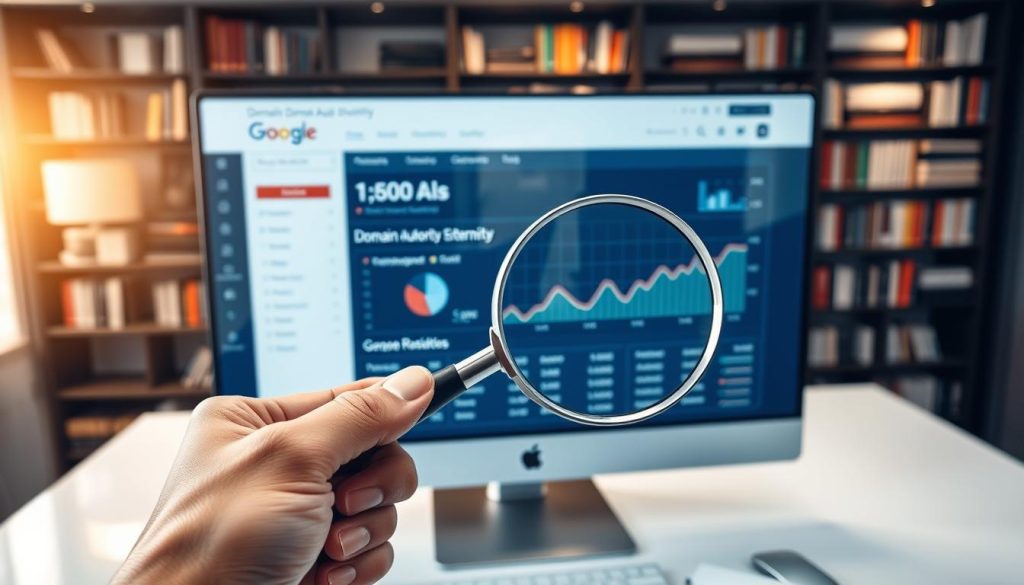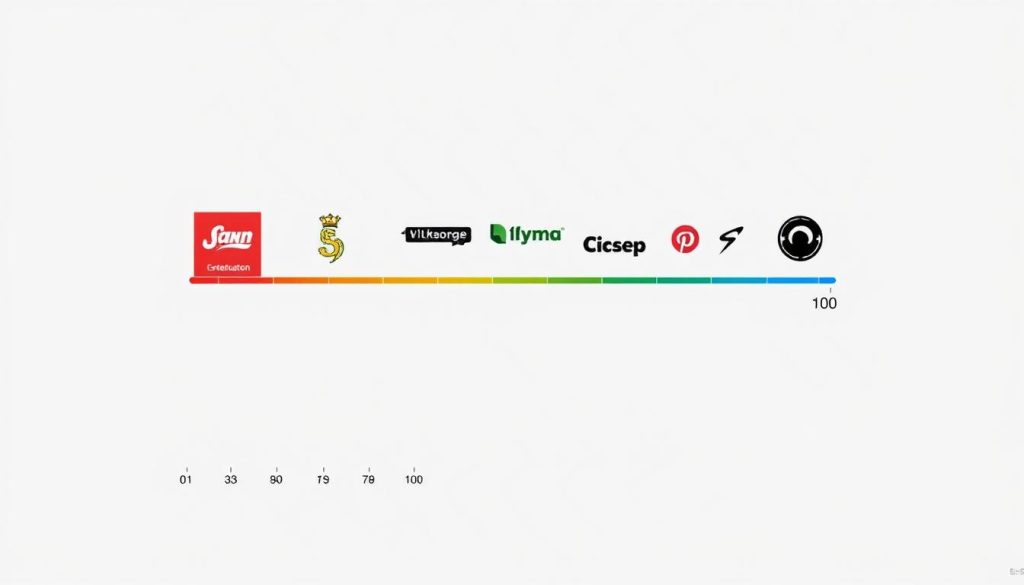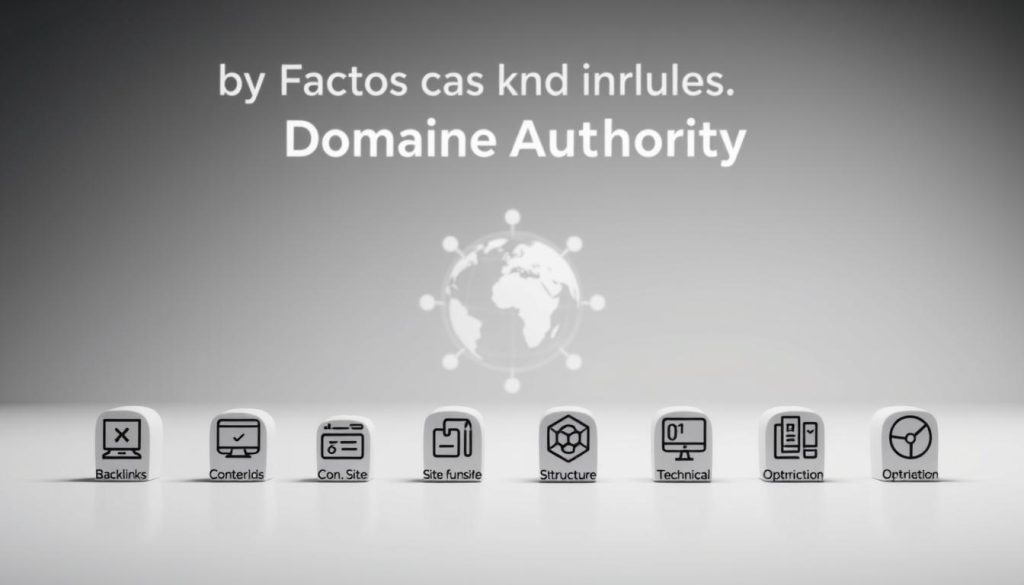Welcome to your first steps into the world of search engine optimization! This guide is here to help you understand a key concept that can shape your website’s future. We’ll explore a crucial metric that acts like a report card for your online presence.
Think of this score as a measure of your site’s credibility and power in the vast web. It tells search engines and visitors how trustworthy your content is. A higher score means your site is seen as more authoritative.
This concept was introduced to help webmasters predict their search ranking potential. It’s not a direct ranking factor, but it strongly correlates with your ability to rank well. Understanding this metric is essential for any effective référencement strategy.
By the end of this guide, you’ll know practical steps to boost your site’s standing. Whether you’re launching a new site or improving an existing one, this knowledge is vital for long-term success.
Table of Contents
Key Takeaways
- Domain Authority is a score that predicts how well a website might rank on search engines.
- It was created by Moz and uses a scale from 0 to 100.
- A higher score indicates a more powerful and credible site.
- It is a comparative tool, not a direct Google ranking factor.
- Improving this metric can significantly enhance your site’s visibility.
- For detailed strategies, see our guide on how to improve your website’s domain.
Defining Domain Authority
The term ‘Domain Authority’ was coined to simplify a complex idea. It represents a powerful indicateur for your website’s potential.
Origin and Concept
Moz introduced this score in 2010. They wanted a standard way to measure a site‘s strength. It works on a 0 to 100 scale.

New websites start low. Established giants like Wikipedia score much higher. This indicateur helps predict search engine rankings.
What It Means for Websites
Think of it as a reputation score. A higher number means search engines see your site as more trustworthy.
It synthesizes many factors into one easy-to-understand number. This helps you track your SEO progress effectively.
Improving your autorité domaine can lead to better visibility. It’s a key part of any successful online strategy.
The Importance of Domain Authority in SEO
Search engines have evolved significantly in how they evaluate websites, placing greater emphasis on site-wide trust signals. While they once focused mainly on individual pages, modern moteurs recherche now assess your entire site‘s reputation.

Impact on Search Rankings
Your domain authority directly influences your visibility in search résultats recherche. For competitive keywords like « chaussures femme, » studies show you need a minimum score around 29 just to compete.
Sites with scores below 10 struggle to reach the first page, regardless of their on-page optimization. A strong autorité acts as a gatekeeper for highly sought-after keywords.
Building Credibility with Google
When Google trusts your site, it rewards all your content. New pages rank faster and higher when you have established crédibilité.
This creates a compounding effect for your référencement naturel efforts. A score above 50 indicates strong authority that can compete effectively in any niche.
Improving your domain authority benefits your entire site‘s performance across all moteurs recherche. It’s essential for long-term référencement naturel success.
Domain Authority Scale Explained
Understanding the DA scale is crucial for setting realistic SEO goals. This échelle helps you measure your website’s competitive position. It gives you a clear picture of where you stand.

Let’s break down what the numbers really mean. Each range on the échelle 100 represents a different level of online influence.
Interpreting the 0-to-100 Scale
Your score tells a story about your website’s reputation. Lower numbers indicate newer or less established sites. Higher numbers show significant online presence.
This domain authority measurement uses a logarithmique scale. This means progress gets harder as you climb higher. Moving from 20 to 30 is easier than from 60 to 70.
| DA Range | Authority Level | Typical Sites |
|---|---|---|
| 0-10 | Very Weak | New websites, minimal backlinks |
| 10-20 | Weak | Basic credibility, decent content |
| 20-40 | OK | Respectable reputation, good links |
| 40-60 | Strong | Established brands, market presence |
| 60-80 | Very Strong | Major companies, hard to challenge |
| 80-100 | Extremely Strong | Industry leaders like Wikipedia |
Your score should be compared against competitors in your niche. A domain authority of 25 might be excellent in one industry but average in another.
This échelle helps you set achievable targets. For detailed guidance on improving your autorité domaine, see our comprehensive domain authority guide.
Remember that the échelle 100 is a comparative tool. It helps you understand your competitive landscape. Use it to identify realistic goals for your autorité domaine growth.
Key Factors Influencing Domain Authority
Multiple components contribute to how search engines perceive your website’s credibility. Moz evaluates about forty different criteria when calculating your site’s power score.

The algorithm remains secret, but we know certain elements carry significant weight. Understanding these factors helps you focus your optimization efforts effectively.
Quality and Quantity of Backlinks
Backlinks pointing to your site web remain the most influential factor. The qualité of these liens matters more than sheer quantity.
When reputable sites create liens pointant vers your content, it acts as a powerful endorsement. Ten liens from ten different quality domains beat one hundred from a single source.
Links from industry-relevant sites demonstrate topical relevance. This strengthens your position within your specific niche.
Content Quality and User Experience
Exceptional contenu naturally attracts valuable backlinks. Search engines reward sites that provide genuine value to visitors.
User experience elements like site speed and mobile responsiveness contribute significantly. Good navigation and engagement metrics signal qualité to search algorithms.
Technical factors ensure proper distribution of link equity throughout your site web. A well-structured site maximizes the impact of every lien externe you earn.
Strategies to Optimize Domain Authority
To elevate your website’s standing, you’ll need to combine multiple tactics that reinforce each other over time. This comprehensive approach ensures your site builds momentum steadily rather than through quick fixes.
Focus on sustainable actions that create lasting improvements. Your efforts should target both technical foundations and content quality simultaneously.
On-Page SEO and Technical Improvements
Start by optimizing your site‘s technical performance. Fast loading pages create a better user expérience and help your référencement efforts.
Compress images and minimize code to boost speed. Ensure proper internal linking between all your pages to distribute authority effectively.
Content Development and Consistency
Create valuable contenu that addresses your audience’s needs. A regularly updated blog demonstrates ongoing activity and expertise.
Each piece of contenu should target specific keywords while providing genuine value. Consistent quality signals to search engines that your site remains relevant and authoritative.
Common Pitfalls and Errors to Avoid
Many website owners unintentionally sabotage their SEO efforts by falling into predictable traps. Recognizing these common erreurs can save you from costly setbacks and penalties.
Let’s explore the most damaging mistakes that can hinder your progress.
Misguided Link Building Practices
One of the biggest risks involves poor netlinking strategies. Purchasing backlinks or participating in link schemes violates search engine guidelines.
Always verify the qualité of sites providing your liens. Links from penalized or low-quality sites can harm your autorité.
Avoid these dangerous practices:
- Buying backlinks from questionable sources
- Focusing only on quantity instead of qualité
- Using exact-match anchor text repeatedly
- Ignoring diversity in your liens sources
Overlooking User Experience
Don’t become so focused on netlinking that you neglect your visitors. Technical issues like broken liens and slow pages create frustration.
Search engines recognize when sites prioritize links over user satisfaction. This imbalance can trigger penalties.
Remember that sustainable growth comes from balancing technical netlinking with genuine user value.
Domain Authority: How It Works in Practice
Moz’s proprietary system for determining website strength relies on advanced machine learning techniques trained on massive datasets. This sophisticated approach allows for accurate predictions about search engine performance.
Understanding the Calculation Model
The system analyzes approximately forty different factors to generate your website’s score. While the exact criteria remain secret, the model compares your link profile against top-ranking sites.
Your autorité domaine is fundamentally a relative measure. It shows how closely your website matches successful patterns seen in search results. This comparative approach makes the score most useful when benchmarking against competitors.
The machine learning modèle continuously improves as it processes more data. Moz periodically updates the calcul to reflect Google’s algorithm changes and web trends.
Understanding that domain authority is predictive rather than absolute helps you use it effectively. Focus on improving your autorité domaine relative to competitors rather than chasing a specific number.
This approach ensures your score remains a valuable tool for measuring SEO progress over time.
Tools and Techniques for Measuring Your Domain Authority
Effective SEO management begins with understanding how to properly measure your site’s competitive standing. The right measurement outil provides valuable insights into your progress and helps you set realistic goals.
Moz and Alternative SEO Tools
Moz offers a free Link Explorer outil that gives you instant access to your domain authority score. Simply enter your domain name to see your current standing along with supporting metrics like backlink quantity and spam score.
Several alternatives provide similar measurements. Ahrefs offers Website Authority, while Semrush provides an Authority Score. Each serves as a reliable indicateur of your site’s competitive strength.
Monitoring Progress Over Time
Regular monitoring over temps helps you track improvements. Check your score every three to six months after major SEO campaigns to validate your strategy’s effectiveness.
Use these tools to analyze competitor site performance before targeting competitive keywords. This helps determine if ranking is realistically achievable for your current level.
Beyond the main score, pay attention to supporting metrics like estimated trafic and keyword rankings. These provide a complete picture of your domain’s health and trajectory.
Conclusion
Your journey through website optimization culminates in mastering the key indicators that separate successful sites from the rest. You now possess a comprehensive understanding of how domain authority functions as both a diagnostic tool and strategic roadmap.
Remember that building genuine autorité requires consistent effort across three essential areas: creating valuable content, optimizing user experience, and developing strategic relationships. These pillars work together to improve your search résultats over time.
Don’t expect instant success. Sustainable growth comes from persistent application of the principles in this domain authority guide. Each quality backlink and engaging piece of content strengthens your site‘s foundation.
Start implementing these strategies today. Track your progress regularly and stay committed to the long-term process. Your dedication will transform your site into a trusted resource that both users and search engines value highly.
FAQ
What exactly is domain authority?
Think of it as a search engine’s trust score for your site. It predicts how well your pages might rank. A higher score means better chances of appearing on the first page of results.
Why is this score so important for my website?
It’s a big deal because it helps boost your visibility. When your score is strong, search engines like Google see your site as more credible. This can lead to more visitors finding you organically.
How is the 0-to-100 scale used?
It’s a simple way to gauge your site’s potential. A score of 100 is the best, but it’s tough to achieve. Most sites aim to improve their number over time. It’s a helpful benchmark against competitors.
What are the main things that affect my score?
Two key areas matter most: the quality and number of links pointing to your site (backlinks), and the overall value of your content. Great content that keeps visitors engaged is crucial.
How can I start improving my site’s authority?
Focus on creating fantastic, consistent content that people want to read and share. Also, ensure your site is technically sound with good on-page SEO. Building genuine relationships for quality backlinks helps a ton.
What mistakes should I avoid?
Steer clear of buying links or using shady link-building schemes. These can hurt your standing. Also, never ignore the user’s experience. A slow or confusing site will work against you.
How do I check my current score?
You can use tools like Moz’s Link Explorer, which is popular for this. Other SEO platforms like Ahrefs or SEMrush also offer similar metrics. Tracking your progress monthly is a smart habit.
Is a high score a guarantee of top search rankings?
Not a guarantee, but it’s a powerful advantage. It’s one of many signals search engines use. A strong score combined with excellent content and a great user experience gives you the best shot.





